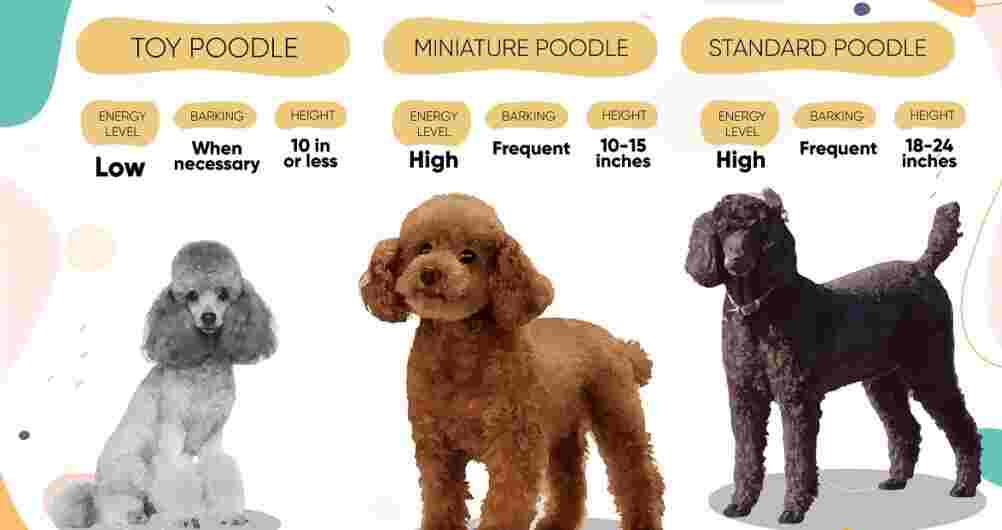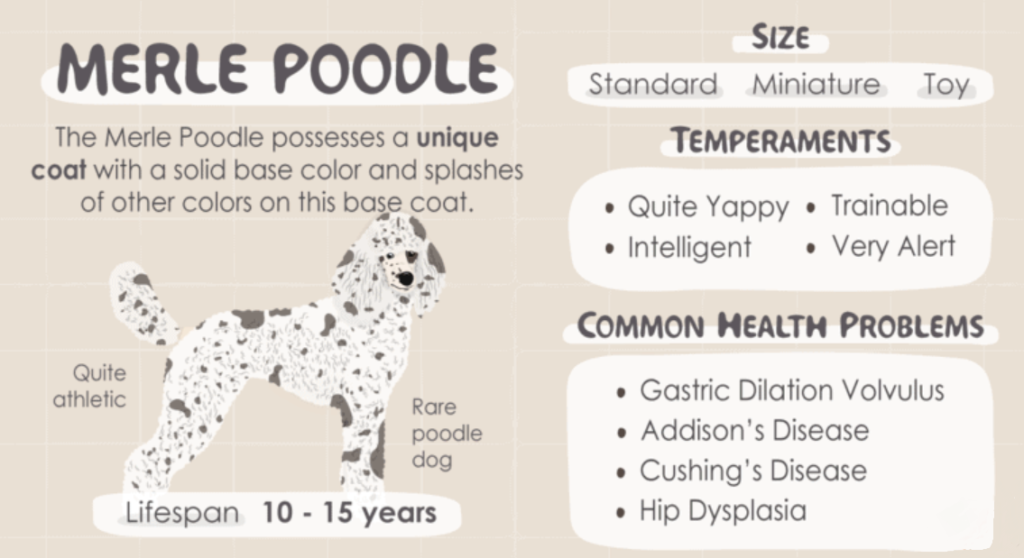Introduction
Merle Poodles health because of their unique patterns. Their description as unique and beautiful with patterns, however, comes along with health considerations that every responsible owner should become enlightened about. After all, learning about the health of a Merle Poodle is important so that your pet would live a long life of happiness in good health. In this article, we will find out the main health problems, care tips, and preventive measures you can take to ensure that your Merle Poodle lives up to a healthy long life.

Merle Coat Genetics and Health
The Merle Poodles owe their unique coloring to an extremely characteristic genetic pattern that causes the dilution of some pigments on its skin, giving it that marbled or dappled appearance. Though strikingly beautiful, the merle gene may sometimes cause health-related issues when two dogs with the merle coat are bred together, notably problems concerning hearing and vision. The responsible breeding of healthy Merle Poodles minimizes problems associated with this gene.
Merle gene is dominant. That’s to say, if you would mate a Merle Poodle with any other breed of dog that does not carry the merle gene, it will definitely pass on the gene on to its offspring. Still, elite breeders would not breed from merle to merle because puppies double merle have a higher risk of severe health problems. If you are planning to get a Merle Poodle for your household, be sure to find a breeder who is giving more importance to the health of their dogs than the feature.
Common Health Issues in Merle Poodles
Merle Poodles are usually quite healthy, like all other Poodles; however, there are a few health issues more prevalent with the Merle genetics. These tend to be hip dysplasia, PRA, and epilepsy. Being on top of such conditions with regular visits to see a vet will ensure that owners can be pretty well-equipped in taking care of their dog.
As the years go by, Merle Poodles will suffer from hip dysplasia-a condition in which the ball and socket of the hip joint do not fit as they should-resulting in pain and loss of mobility. PRA, or progressive retinal atrophy, is a genetic condition that leads to blindness, though not until relatively late in life. Although there is no cure, early detection and management can be very helpful to dogs. Additionally, some Merle Poodles may be more prone to seizures that can be associated with epilepsy. In such cases, careful monitoring and early treatment are of major importance.

Merle Poodles are at an increased risk for eye problems, particularly if they inherit two copies of the merle gene. Common eye conditions include microphthalmia, where the eyes are abnormally small, or coloboma, a condition that affects the development of the eye tissue. Regular eye exams by a veterinarian are crucial in detecting early signs of these problems. Additionally, if you notice signs of discomfort, such as squinting, excessive tearing, or redness, consult your vet immediately.
Deafness and Hearing Issues in Merle Poodles
Deafness is another significant concern in Merle Poodles, particularly in double merles. Even single merle Poodles can have a higher chance of congenital hearing loss. Testing for hearing ability early on is critical, and owners of Merle Poodles should be aware of this potential issue. Vets can perform tests, such as the BAER test, to assess a dog’s hearing. Ensuring a stimulating environment with plenty of visual cues can help a hearing-impaired Poodle thrive.
Maintaining a Healthy Diet for Your Merle Poodle
A balanced diet is vital for the overall health of any dog, including Merle Poodles. Their diet should consist of high-quality protein, healthy fats, and essential vitamins and minerals. Merle Poodles with sensitive skin or other health issues may benefit from specific diets, such as those rich in omega-3 fatty acids to support skin and coat health. It’s important to consult your vet about the best dietary plan for your Poodle to avoid obesity and related health issues, which can exacerbate problems like hip dysplasia.
Exercise Requirements for Merle Poodles
Like all Poodles, Merle Poodles are an energetic breed that requires regular exercise to maintain their physical and mental health. Regular walks, playtime, and even agility training can help keep your Merle Poodle fit. Exercise not only keeps them in shape but also helps with mental stimulation, preventing boredom and destructive behaviors. Ensure that your Merle Poodle gets enough activity each day based on their size—standard Poodles generally need more exercise than toy or miniature Poodles.
Grooming and Coat Care for Merle Poodles
Grooming is an essential part of Merle Poodle care. Their curly coats can become matted if not properly maintained, so regular brushing is required to keep their fur healthy. A professional grooming schedule, including regular baths and trims, is highly recommended to maintain their beautiful coat. Poodles are also hypoallergenic, making them an excellent choice for families with allergies, but regular grooming is still necessary to keep their coat in top condition.
Preventive Healthcare for Merle Poodles
Preventive healthcare is essential for the long-term well-being of Merle Poodles. Regular vet visits, vaccinations, and health screenings for genetic disorders should be part of your care routine. Dental health is another important aspect often overlooked—regular brushing and dental check-ups can prevent issues like periodontal disease. Flea, tick, and heartworm preventatives should also be a regular part of your dog’s healthcare regimen.
Recognizing Signs of Health Problems Early
Early detection of health problems can make a significant difference in the outcome. Be vigilant for signs of discomfort or unusual behavior in your Merle Poodle, such as limping, changes in appetite, lethargy, or skin irritations. Prompt veterinary care can address these issues before they become more serious. Regular check-ups, combined with your awareness of your dog’s habits and health, can help ensure that your Merle Poodle remains healthy and happy for years to come.
FAQs
More Likely to Suffer from Health Problems than Any Other Poodle?
Yes, Merle Poodles are more vulnerable to vision and hearing loss. But controlled breeding minimizes the risk posed by this gene.
What is a double merle Poodle?
Double merle Poodle refers to mating two dogs with the color merle, thus raising the possibility of contracting health issues or abnormalities like blindness and deafness.
How can I prevent my Merle Poodle from suffering from health issues?
Regular vet visits, good diet, suitable exercise, and no breeding merle-to-merle are the keys to making sure health problems do not occur.
Do Merle Poodles require some special grooming?
Merle Poodles require as much grooming as any Poodle does; however, special attention has to be paid to their lighter skin to avoid sun exposure.
Do Merle Poodles go blind?
Some of the Merle Poodles could develop vision issues. especially if inherited from both parents by the merle gene. Regular eye exams should be done.
How often should I bring in my Merle Poodle to the vet?
Preventive care and checks should be done at least every six months; more than that for vision, hearing, and joint health.
What should my Merle Poodle eat?
A high-quality, protein-rich diet with omega-3 fatty acids is what a Merle Poodle would thrive off of to supply a healthy coat in addition to an otherwise healthy dog.
Are Merle Poodles more prone to skin issues than others?
No.
They might be more sensitive to sunlight and could have other allergies for the skin; therefore, they require proper grooming and skin care.

Lifespan
12 – 15 years

Size
Small / Toy Breed

Weight
4 – 6 LBS

Height
Up to 10 inches


Pingback: Merle Poodles Stud Service : A Complete Guide – My Blog
Pingback: Merle Poodle Genetics : Info Inheritance & History - Merle Poodle
Pingback: Merle Poodle Define : History & Origin Overview - Merle Poodle
Pingback: Merle Colored Poodles : The Ultimate Guide